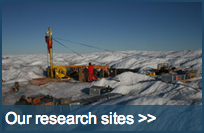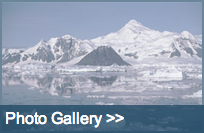Sea-level rise is one area of climate projections where a plethora of recent observations of rapid change suggest that scientists do not yet understand all the processes required to predict the future. Despite rapid progress in model development within programmes like ice2sea, even state-of-the-art ice sheet models still do not simulate all the processes that glaciologists suspect may be significant. It is therefore important that the likely uncertainties associated with all processes, modelled and unmodelled, are quantified to the best of our abilities.
A study, the first of its kind in glaciology, published on Sunday 6th January 2013 in Nature Climate Change sheds light on the largest remaining uncertainty in sea-level rise projections. Researchers, led by University of Bristol, employed a technique called “structured expert elicitation.” This is a method that is already used in a number of other scientific fields such as forecasting volcanic eruptions. It pools experts’ opinions in a mathematically rigorous way to produce an assessment of uncertainty.
Publication: Bamber, J. L., and W. P. Aspinall (2013), An assessment of expert opinion on future sea-level rise from melting of ice sheets, Nature Climate Change, 1-5.


